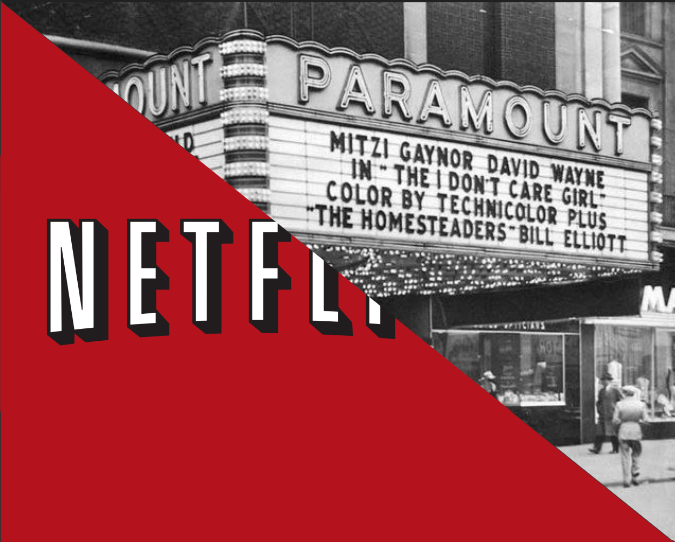
The Paramount theater and Netflix logo / Photoshopped by Juliette McKenney
The film industry before 1948 was a drastically different place than that of the later 20th century. As films became more popular and profitable, giant studio companies began to completely dominate the industry. They controlled manufacturing from inception to distribution of all popular movies of the time. Because these companies owned their own means of distribution (movie theaters) they had no incentive to make interesting or innovative films. No matter how good the product was, they knew they could show it in theaters. The companies also had no incentive to distribute films made by smaller companies, since they could make more money off their own films (which they didn’t have to pay to distribute).
In 1948 the studio system was overthrown by the Paramount Consent Decrees. The decrees forced large studios of the time to sell or otherwise get rid of their movie theaters, disconnecting the film production industry from the film distribution industry, and allowing for more up-and-coming studios to exist leading to a more creative industry overall. In 2020 — at the height of the pandemic — the supreme court repealed the Paramount Consent Decrees, which in itself has had little legal effect considering they were only applicable to eight of the top ‘40s studios.
In recent years a similar monopoly to that of the old Hollywood studios has grown in modern streaming services. Because Disney, Netflix, and other big streaming companies own their means of distribution (streaming platforms) they, again, have no incentive to change up movies or films. They have little reason to make anything fresh or particularly different, rather they can simply produce a film according to tried and tested formulas (Marvel, I’m looking at you) and have a guarantee that they will be seen on the streaming platforms.
Monopolies like this in the film industry allow for two major problems to form. First of all, they promote safe bets that contain more style than substance. When it comes down to it, most people will willingly watch a well-produced movie with witty dialogue, even if the plot is lackluster if it is the one that is most available to them. Most people get used to seeing whatever rom-com or action movie Netflix has served up this week and stop looking for other projects. This practice crushes art. Secondly, because the industry is entirely dominated by these companies it allows the CEOs and board members to set industry standards. As seen in recent Hollywood writers and actors union strikes this is not beneficial to anyone but the owners and investors of the studios. The people who actually make the films are underpaid, overworked, and their ideas are treated with very little respect because companies have no reason to improve working conditions when the workers have nowhere else to go.
